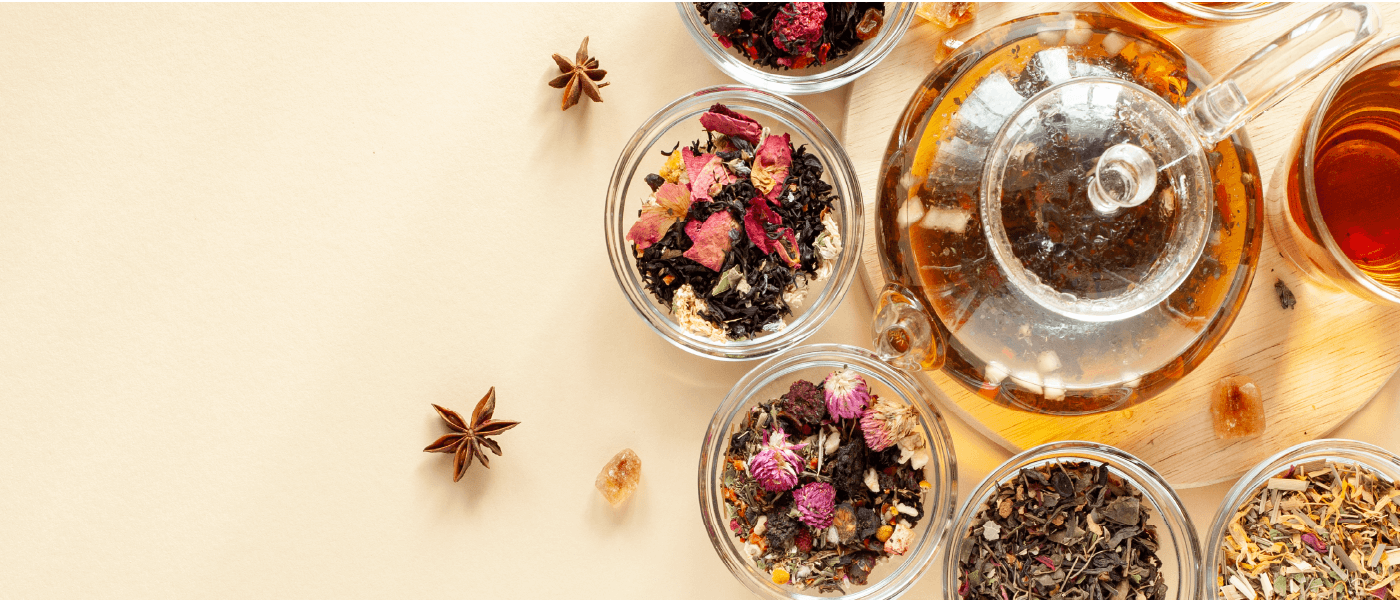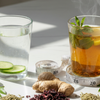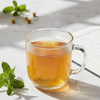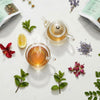Wellness Teas 101: Your Complete Guide to Natural Health Through Tea

In our fast-paced world, finding moments of balance and wellness can feel like a luxury. But what if achieving better health could be as simple as brewing a cup of tea? Welcome to the world of wellness teas – nature's pharmacy in a cup, offering everything from stress relief to glowing skin, all through carefully crafted herbal blends.
What Are Wellness Teas?
Wellness teas go beyond your typical morning cup of Earl Grey. These are thoughtfully formulated blends of herbs, flowers, roots, and traditional tea leaves, each chosen for specific health benefits. Unlike synthetic supplements, wellness teas offer a gentle, natural approach to supporting your body's systems while providing the ritual of mindful consumption.
The concept isn't new – traditional medicine systems like Ayurveda and Traditional Chinese Medicine have used herbal teas for thousands of years. What's evolved is our understanding of these ingredients' specific benefits and how to combine them for maximum effectiveness.
The Science Behind Herbal Wellness
Modern research has validated what ancient healers knew intuitively: plants contain powerful compounds that can support human health. These phytochemicals work synergistically, meaning the whole blend often provides greater benefits than individual ingredients alone.
Adaptogens like Ashwagandha help your body manage stress, while antioxidants from ingredients like hibiscus and green tea protect cells from damage. Anti-inflammatory compounds in turmeric and ginger support overall wellness, and digestive aids like fennel and peppermint promote gut health.
Categories of Wellness Teas
Stress Relief & Sleep Support
Life's demands can overwhelm our nervous systems, making quality rest elusive. Sleep-supporting teas typically feature calming herbs that have been used for centuries:
- Chamomile: Contains apigenin, which binds to brain receptors to promote sleepiness
- Lavender: Provides natural aromatherapy benefits and nervous system support
- Passion Flower: Traditionally used for anxiety and restlessness
- Blue Lotus: Ancient herb known for promoting vivid dreams and deep relaxation
- Lemon Balm: Gentle nervine that soothes both mind and digestive system
Digestive Wellness
Your gut health impacts everything from immunity to mood. Digestive wellness teas combine carminative (gas-relieving) and digestive-stimulating herbs:
- Peppermint: Relaxes digestive muscles and provides cooling relief
- Fennel: Reduces bloating and supports healthy gut motility
- Chamomile: Soothes inflammation throughout the digestive tract
- Dandelion Root: Supports liver function and bile production
- Ginger: Stimulates digestion and reduces nausea
Beauty & Anti-Aging
True beauty radiates from within, and certain herbs support skin health, cellular repair, and natural radiance:
- Hibiscus: Rich in vitamin C and natural fruit acids for skin brightness
- Rose Petals: Provide antioxidants and mood-lifting aromatherapy
- Goji Berries: Packed with vitamins and minerals for cellular protection
- Moringa: Superfood herb with comprehensive nutritional support
- Nettle: Rich in silica and minerals for hair, skin, and nail health
Energy & Metabolism
Sustainable energy comes from supporting your body's natural processes rather than relying on stimulants alone:
- Green Tea: Provides L-theanine for calm alertness alongside natural caffeine
- Yerba Mate: Offers sustained energy without the jitters
- Ginger: Supports circulation and metabolism
- Cinnamon: Helps balance blood sugar for steady energy
- Cardamom: Aids digestion and provides aromatic stimulation
Immune Support
Your immune system works best when supported by consistent, gentle nourishment:
- Tulsi (Holy Basil): Adaptogenic herb that supports overall resilience
- Turmeric: Powerful anti-inflammatory and immune-supporting root
- Hibiscus: High in vitamin C and antioxidants
- Chrysanthemum: Traditional cooling herb that supports eye and liver health
- Black Cumin Seed: Historically valued for comprehensive wellness support
Key Ingredients Spotlight
Ashwagandha: The Stress Warrior
This adaptogenic root helps your body manage stress more effectively. Research shows it can reduce cortisol levels, improve sleep quality, and support sustained energy without overstimulation.
Turmeric: Golden Healing
Curcumin, turmeric's active compound, provides potent anti-inflammatory effects. When combined with black pepper or other warming spices, its absorption increases significantly.
Hibiscus: The Beauty Flower
This tart, cranberry-like flower is loaded with anthocyanins – the same antioxidants that make berries so beneficial. It supports heart health, provides natural vitamin C, and gives teas a beautiful ruby color.
Chamomile: The Gentle Healer
Perhaps the most universally beloved herbal tea, chamomile works on multiple systems. Its anti-inflammatory compounds soothe digestive upset while its mild sedative effects promote relaxation.
How to Choose Your Wellness Tea
Consider Your Primary Goals:
- Need better sleep? Look for blends with chamomile, lavender, and passion flower
- Seeking digestive support? Choose teas with peppermint, fennel, and ginger
- Want glowing skin? Opt for antioxidant-rich blends with hibiscus and rose petals
- Looking for sustained energy? Try green tea blends with adaptogenic herbs
Quality Matters:
- Choose organic ingredients when possible
- Look for whole leaf teas rather than dust or fannings
- Seek brands that provide detailed ingredient lists
- Consider the source – ethically sourced herbs often provide better quality
Personal Tolerance:
- Start with single-ingredient teas to understand your body's responses
- Some herbs like tulsi and ashwagandha may take weeks of consistent use to show benefits
- Pay attention to how different teas affect you at various times of day
Brewing the Perfect Wellness Cup
Temperature Matters:
- Green teas: 175-185°F to preserve delicate compounds
- Herbal teas: Full boiling (212°F) to extract therapeutic compounds
- White teas: 160-175°F for optimal flavor and benefit extraction
Steeping Time:
- Most herbal blends benefit from 5-7 minutes of steeping
- Longer steeping extracts more therapeutic compounds but may increase bitterness
- Root-based teas (like turmeric or ginger) can handle longer steeping times
Enhancement Tips:
- Add a pinch of black pepper to turmeric-containing teas for better absorption
- Raw honey not only sweetens but provides additional antimicrobial benefits
- Fresh lemon enhances absorption of certain antioxidants
Creating Your Daily Tea Ritual
Morning Energizers: Start your day with metabolism-supporting blends containing green tea, ginger, and warming spices. These provide gentle energy while supporting digestive health.
Afternoon Reset: Combat the post-lunch energy dip with adaptogenic blends featuring tulsi, ashwagandha, or ginseng. These help manage stress while providing sustained energy.
Evening Wind-Down: Transition to sleep-supporting herbs like chamomile, lavender, and passion flower. Make this part of your bedtime routine for maximum benefit.
Weekend Deep Wellness: Use your relaxed schedule to enjoy more complex, therapeutic blends that might require longer steeping or multiple cups throughout the day.
Safety and Considerations
While wellness teas are generally safe, some important considerations include:
Medication Interactions: Certain herbs can interact with medications. Consult healthcare providers if you take prescription drugs, especially blood thinners or diabetes medications.
Pregnancy and Nursing: Many herbs aren't recommended during pregnancy or breastfeeding. Always check with your healthcare provider.
Allergies: If you have plant allergies, introduce new herbal teas gradually and pay attention to any reactions.
Quality Control: Choose reputable brands that test for contaminants and provide transparent sourcing information.
The Future of Wellness Teas
As research continues to validate traditional uses of herbal medicines, we're seeing more sophisticated blending approaches. Formulators now combine traditional wisdom with modern nutritional science, creating targeted blends for specific wellness goals.
The sustainability movement is also influencing tea production, with increased focus on regenerative farming practices that not only produce better herbs but also support environmental health.
Making Wellness Tea Part of Your Life
The beauty of wellness teas lies not just in their therapeutic benefits but in the ritual they create. In our screen-dominated world, the simple act of brewing and mindfully sipping tea provides moments of presence and self-care.
Start small – choose one or two teas that address your primary wellness concerns. Create a consistent routine, whether that's morning energy support or evening relaxation. Pay attention to how you feel, both immediately after drinking and over time with consistent use.
Remember that wellness teas are most effective as part of a holistic approach to health. They complement, rather than replace, fundamental wellness practices like adequate sleep, regular movement, stress management, and nutritious eating.
Your Journey to Balance
Wellness teas offer a gentle, enjoyable path to better health – one sip at a time. Whether you're seeking better sleep, clearer skin, improved digestion, or simply a moment of calm in your busy day, there's likely a carefully crafted herbal blend that can support your journey.
The key is consistency, quality, and mindful consumption. As you explore the world of wellness teas, you're not just nourishing your body – you're participating in an ancient tradition of natural healing that connects you to generations of wisdom about the therapeutic power of plants.
Start your wellness tea journey today, and discover how these natural blends can help you find your perfect balance in life's daily rhythm.




